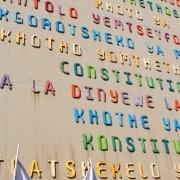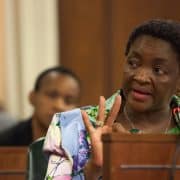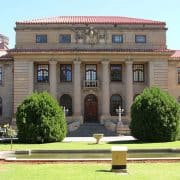|
Getting your Trinity Audio player ready...
|
By Patience Mkosana and Phemelo Khaas
The year 2020 brought unprecedented challenges due to the profound effect of the Covid-19 pandemic on the lives of millions of people around the world. The enforcement of lockdowns to contain the spread of the virus meant that people had to quickly adopt different ways of doing things.
Likewise, on the anti-corruption front, we also had to explore new ways of doing our work. Here at Corruption Watch (CW), we had to readjust and rethink our implementation plans for the year. Because of the lockdown restrictions, we suspended our face-to-face outreach programmes and instead partnered with 13 community radio stations in Gauteng, Eastern Cape and Mpumalanga provinces. The on-air engagements sought to empower communities to identify and report corruption. The topics included, among others, corruption in the health and policing sector, food parcels, and special grants such as Temporary Employer / Employee Relief Scheme (TERS).
The corrupt took advantage of the environment and plundered resources at a time when they were needed the most. CW saw an increase in the number of reports brought to us during this period. This influx of complaints meant that there was no taking our feet off the pedal, as communities were even more vulnerable to the threat of the virus, and were reaching out to us for help. We collaborated with key stakeholders to tackle these cases.
In the first quarter of 2021, we will also release a report relating to complaints we received about TERS. That fact that funds assigned to provide relief to employees already embattled by the impact of Covid should be vulnerable to corruption is difficult to comprehend.
Furthermore, because of an increase in reported cases of police violence and brutality because of the lockdown, we released Know Your Rights brochures to assist communities when they engaged with the police.
The revelations of corruption in the Covid-19 relief funds were shocking, to say the least. In May, we raised our concerns in a letter to National Treasury regarding the repeal and release of different instruction notes relating to emergency procurement under Covid-19. The following month, we made a submission in relation to the draft Public Procurement Bill, calling for increased measures in relation to governance, accountability and transparency.
Helping to develop effective laws that benefit the public
The fight against corruption also entails contributing towards creating an environment that deters corruption. This can include identifying gaps in the system that are a breeding ground for corruption and taking a proactive stance to prevent occurrence of corruption in the future. Here are some of the interventions and victories that we accomplished in 2020:
- In February, CW celebrated the final decision of the Constitutional Court to dismiss the Cash Paymaster Services (CPS) application for leave to appeal the Supreme Court of Appeal judgment that ordered them to repay R316-million to the South African Social Security Agency (Sassa). This relates to the matter brought by Corruption Watch against CPS concerning the unlawful payment from Sassa to CPS. The court ruled that the CPS appeal had no reasonable prospects of success and did not qualify as a constitutional matter for consideration.
- Again, in February, we made a submission on the draft amendments to the Mineral and Petroleum Resources Development Act (MPRDA) regulations, highlighting key issues in relation to the mining sector.
- In June, we made a submission to the draft Public Procurement Bill in response to National Treasury’s gazetted call for comments.
- In July, we wrote to the parliamentary Ad Hoc Committee on the Appointment of the Auditor-General with a detailed submission containing our views, plans and recommendations for the process. The committee met to discuss our submission and obtained a legal opinion that concluded and advised the committee to accept and implement all of our recommendations – albeit with a few tweaks.
- In October, we wrote a letter to the minister of trade and industry, Ebrahim Patel, and the Portfolio Committee on Trade and Industry regarding the appointments to the National Lotteries Commission board. In turn, Minister Patel implemented a number of our recommendations.
Tackling corruption through collaborations
Strengthening the fight against corruption is a collective responsibility. Here are some the collaborations we were part of in 2020:
- Health Sector Anti-Corruption Forum – This is a multi-agency body appointed by President Ramaphosa, designed to fight fraud and corruption in the health sector. The forum is made up of various stakeholders including the Department of Health, the Council for Medical Schemes, the Health Professions Council of South Africa, Directorate for Priority Crime Investigation, Section27, Corruption Watch, and others.
- National Anti-Corruption Strategy Reference Group – This group was tasked with developing an anti-corruption strategy for South Africa. In November, the Cabinet approved the strategy that will enable the country to step up the fight against corruption and fraud. It was comprised of civil society, academia, business and government representatives. The strategy will be launched for implementation in early 2021.
- Civil Society Working Group on State Capture – The group represents civil society organisations that have made submissions to the Zondo commission, and are focused on advocacy and other activities to support and challenge the Zondo commission to meet its objectives.
- Stop Covid-19 Corruption / Orange Mask Campaign – #OrangeMasksFriday Campaign – This initiative, spearheaded by the Ahmed Kathrada Foundation, during 2020 brought together a diverse group of civil society and on the ground organisations, which mobilised anti-corruption activities each Friday, using the hashtag #OrangeMaskFriday.
- Budget Justice Coalition – A coalition of civil society organisations with the aim of building people’s participation in and understanding of South Africa’s budget and planning processes. The coalition organises budget advocacy to mobilise the power of the people to ensure that the government advances social, economic and environmental justice that meets people’s rights, quality of life and dignity in a developmental, equitable and redistributive way.
- We teamed up with the Extractives Industry Transparency Initiative (EITI) to encourage the South African government to sign up as a member of the EITI standard of transparency in the mining sector.
- We worked with Amabhunghane, Open Ownership, the Department of Public Service and Administration, and the Financial Intelligence Centre to help develop beneficial ownership transparency standards through the Open Government Partnership process.
- We developed a business integrity tool with the International Council on Mining and Metals to enable mining companies to assess their policies and procedures against corruption trends, vulnerability and risks in mineral approvals processes, or engagements with government and third parties.
Extending the public knowledge base in the fight against corruption
In 2020, CW continued to generate a wide array of reports to provide crucial knowledge on the state of corruption in South Africa. In some cases, these reports amplified the voices of people on the ground, and included our research projects. Here are some of the publications released during this period:
- Money down the Drain: Corruption in South Africa’s water sector
- The Writing is on the Wall: 2019 annual report
- Costly Protection: Corruption in South Africa’s Asylum System
- Analysis of Corruption Trends: 2020 half-yearly report
- X-Ray: The Critical State of the Health Sector in SA
- Transparency in Corporate Reporting: South Africa 2020
- Our Future is not for Sale: youth survey report
Finally, we ended the year on a high note by collaborating with local graffiti artist Mars to commemorate International Anti-Corruption Day on 9 December. We amplified the 2020 theme Recover with Integrity on a wall at the intersection of Jan Smuts Avenue and Empire Road in Johannesburg. Take a look at this beautiful piece of art.
Many thanks to all our supporters for joining our efforts in the fight against corruption, particularly in such a challenging year. We wish you all the best in the year ahead and we hope you will continue to journey with us for years to come!





